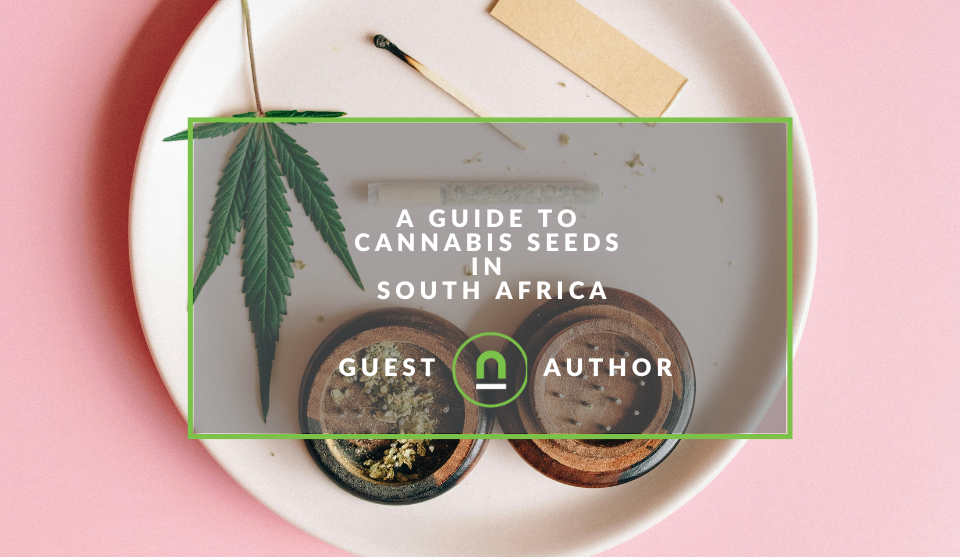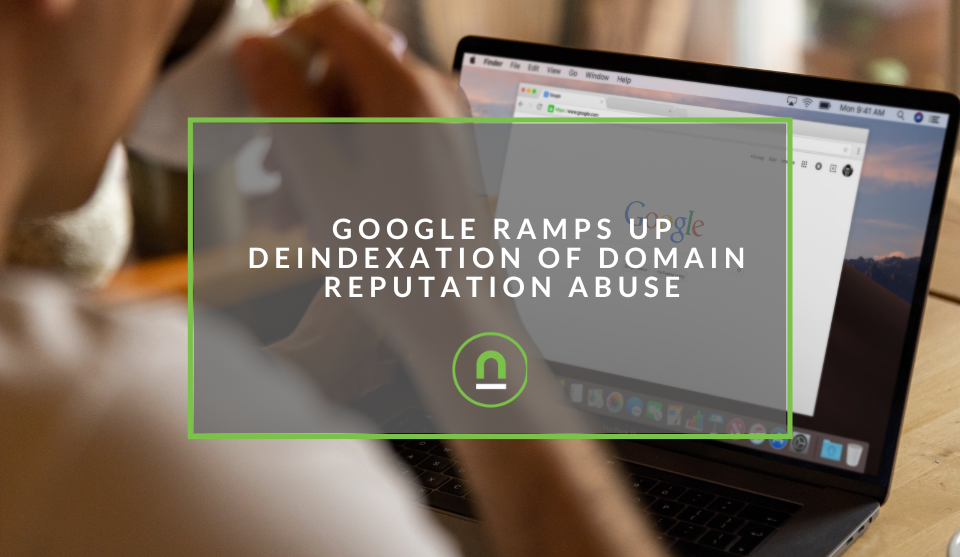Recent posts

Shopaholics
How to Choose A Perfect 2-Seater Couch for Small Spaces
28 February 2025

Money Talks
How Crypto Technology Continues To Revolutionise The Business World
27 February 2025

nichemarket Advice
How to Choose the Best Copy Trading Platforms for Maximum Return
24 February 2025

Mind, Body & Soul
A Guide to Cannabis Seeds in South Africa
21 February 2025
Popular posts
Extravaganza
Trending Music Hashtags To Get Your Posts Noticed
24 August 2018
Geek Chic
How To Fix iPhone/iPad Only Charging In Certain Positions
05 July 2020
Extravaganza
Trending Wedding Hashtags To Get Your Posts Noticed
18 September 2018
Money Talks
How To Find Coupons & Vouchers Online In South Africa
28 March 2019
Google Ramps Up De-indexing of Domain Reputation Abuse
24 November 2024 | 0 comments | Posted by Che Kohler in nichemarket Advice
When you're one of the biggest distributors of high-quality web traffic, you will have to accept that there will be entities out there willing to do anything to attract your user base to their site.
It's part of why Google's core algorithm needs to be refined constantly and why the secret sauce that goes into it is one of the biggest state secrets; if Google gave that away, rankings would be even worse than they are today.
I will concede and am the first to complain that Google's SERP experience and rankings have been pretty terrible since HCU in September 2023, and the forcing of LLMs into everything Google does is still relatively better than what we had 1 to 2 decades ago.
If you don't believe me, Ask Jeeves!
While Google comes to terms with its own faults, it also has to deal with the growing deceptive practice known as domain reputation abuse, which has become increasingly prevalent across the internet. This technique exploits the trust built by established domains to generate revenue through misleading traffic monetisation schemes.
For all the complexity of the core ranking system, Google still relies on some tried and tested factors, such as domain age, backlink profile and freshness of content, something media publications have in droves, which is why getting an article, media mention or press release with a link to your site from a large publication is so sought after, it can drive massive referral traffic and of course bump up your sites organic rankings.
Google, of course, has a soft spot for media publications; it feeds its regular traffic demands for trending searches and feeds its news section and its Google Discover section.
It's a nice little symbiosis: media sites produce articles, Google feeds them to its searchers, and everyone is happy.
Right? WRONG!
The ad publishing business isn't what it used to be
There was a time when Google had a pretty sweet setup with publishers. They sent them traffic, the publishers ran ads on their sites via Google Adsense, and Google got a piece of that revenue.
But with any gold rush, you'll have people coming in to get a piece of it, and with increased competition, more content, fighting for eyeballs, and Google trying to get more for themselves and less for you, the ad revenue started to dry up.
Many Google AdSense publishers have reported massive declines in earnings and RPMs (page revenue per thousand impressions) since late, and they reported the switch from CPC to CPM bidding in AdSense.
There is no shortage of complaints on Google AdSense Forums, with smaller publishers claiming drops of 70% or so in their earnings and RPM. A loss very few can sustain and run a business without looking toward dusting off the CV and heading to their local Micky D's.
What to do about falling revenue?
Google Adsense isn't the only game in town, but it is by far the biggest. It will always form part of any publisher's ad inventory, but if they're not paying well enough, their ads become the floor price, and you go out looking for publishers willing to pay you more for your traffic.
Publishers looked to alternative ad networks to add more competition to Adsense and made direct deals to try and make up for the shortfall.
When that didn't work, they moved on to paid articles, subscriptions and paywalls, which has helped some sites add a healthy revenue stream, but it would never be a replacement for total revenue lost.
So, what are large media sites doing? They're taking their established domain, spinning up subfolders or subdomains that will rank with relative ease, and pumping those sections of their site with pages to monetise through ads and affiliate links.
What Is Domain Reputation Abuse?
Domain reputation abuse occurs when bad actors purchase expired or abandoned domains that have previously built up strong credibility and trust signals.
These domains might have once belonged to legitimate businesses, educational institutions, or organisations that maintained good standing with search engines and users alike.
The key aspects of this abuse include:
- Acquiring domains with established backlink profiles and age-based authority
- Leveraging the domain's existing trust signals and SEO equity
- Repurposing the domain for content that's drastically different from its original purpose
- Using the inherited authority to rank quickly for profitable keywords
Some examples that Google provides are:
- An educational site hosting a page about reviews of payday loans written by a third-party that distributes the same page to other sites across the web, with the main purpose of manipulating search rankings
- A movie review site hosting third-party pages about topics that would be confusing to users to find on a movie review site (such as “ways to buy followers on social media sites”, the “best fortune teller sites”, and the “best essay writing services”), where the purpose is to manipulate search rankings
Why Are Sites Using This Technique?
The motivation behind domain reputation abuse is primarily financial. By purchasing pre-trusted domains, these operators can bypass the usual time and effort required to build domain authority organically.
This creates several advantages:
Immediate Trust Signals
When a domain has existed for many years and accumulated quality backlinks, search engines initially view it as more trustworthy than a brand-new domain. This inherited trust allows the new content to rank more quickly and with less effort.
Cost-Effective Traffic Generation
Building authority for a new domain requires significant investment in content creation, link building, and time. Domain reputation abuse provides a shortcut to these trust signals at a fraction of the cost.
Higher Ad Revenue
With better search rankings comes increased traffic, which these sites monetise through advertising networks, affiliate marketing, or other revenue-generating schemes. The content is often thin or AI-generated, maximising profit margins.
Google's Crackdown
Google has begun taking aggressive action against domain reputation abuse for several reasons:
Google's original Site Reputation Abuse policy wiped out 3rd-party coupon subdomains
— Cyrus SEO (@CyrusShepard) November 19, 2024
CNN
CNET
USA Today
Business Insider
What do you think the newly updated policy will target? pic.twitter.com/EBEXr1jbP9
Protecting Search Quality
When domains suddenly switch from providing valuable content to serving low-quality or irrelevant material, users' search experience deteriorates. Google's primary mission is to deliver the most relevant and helpful results to searchers.
Maintaining Trust
Domain reputation abuse exploits Google's trust signals to evaluate site quality. Allowing this practice to continue unchecked makes the entire system of trust metrics less reliable.
New Enforcement Measures
Google has implemented several countermeasures:
- Enhanced algorithms to detect sudden changes in domain ownership and content focus
- Stronger scrutiny of domains that demonstrate dramatic shifts in content themes
- Improved systems for identifying artificially manipulated authority signals
- A growing list of manual reviews and manual penalties/flags
However, these are all band-aids over a bigger problem; some sites have figured out how to "hack" Google, and its algorithm isn’t strong enough to prevent this abuse consistently.
One of the most prominent theories is Google's increased weight on brand authority. During its last few updates, Google killed smaller niche sites, and now this incentive is coming back to bite them since it doesn’t reward true expertise in a specific area.
What This Means for the Future
Google has an egg on its face now, and it will need to figure out a way to filter subject matter experts to the top.
How do they do that? It's up for debate!
The manual flagging will continue while Google cooks up a new set of Algo tweaks.
In the short term, you might see the little guy hit with traffic spikes as Google nukes these bigger players out of niches that they don't belong in, but these manual interventions aren't practical to deal with the scale that Google has to manage.
As Google continues to refine its approach to combating domain reputation abuse, we can expect:
- More sophisticated detection of domain ownership transfers
- Stricter evaluation of content quality after domain ownership changes
- Potential penalties for domains that attempt to exploit inherited trust signals
- Greater emphasis on consistent, authentic content development
- Greater priority on page rank over domain rank
The Game of Whack-a-mole Will Continue Until Search Results Improve
As sites are hit with manual penalties, we're already seeing reports of them rebranding-renaming the subfolder or subdomain, republishing/migrating the content, slapping some 301 redirects on the old URLs that might have acquired some link equity or social traffic and repeating the process.
Domain reputation abuse represents a significant challenge to the integrity of search results and the broader web ecosystem. While it might offer short-term gains for some operators, Google's crackdown signals that this practice is ultimately unsustainable.
You might get caught up in this battle for legitimate website owners and content creators, but stay focused on delivering quality for your readers. Don't try to play these grey hat games; you'll only win stupid prizes in the long run, so stick to the basics, such as building authority through authentic, value-driven content creation and ethical SEO practices.
Contact us
If you would like us to improve the performance of your paid search or want to know more about digital marketing for your business, then don’t be shy. We’re happy to assist. Simply contact us
Are you looking to promote your business?
Business owners can create their free business listings on nichemarket. The more information you provide about your business, the easier it will be for your customers to find you online. Registering with nichemarket is easy; all you will need to do is head over to our sign-up form and follow the instructions.
If you require a more detailed guide on how to create your profile or your listing, then we highly recommend you check out the following articles.
Recommended reading
If you enjoyed this post and have a little extra time to dive deeper down the rabbit hole, why not check out the following posts on SEO and search updates.
You might also like
Permission-Based Marketing: Why Opt-Ins Are Non-Negotiable
07 February 2025
Posted by Alejandra Leyva in Industry Experts
Learn all about permission-based marketing and why it is key for genuine customer engagement. Learn why opt-ins are non-negotiable for building trust...
Read moreExploring Eco-Friendly Materials for Laser Cutting Projects
11 February 2025
Posted by Candice Reed in Constructive Criticism
Are you looking for environmentally friendly materials for laser cutting projects? We take a look at the various materials that would fit your requir...
Read more{{comment.sUserName}}
{{comment.iDayLastEdit}} day ago
{{comment.iDayLastEdit}} days ago
 {{blogcategory.sCategoryName}}
{{blogcategory.sCategoryName}}


